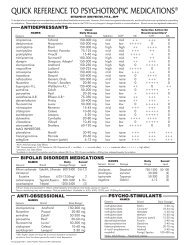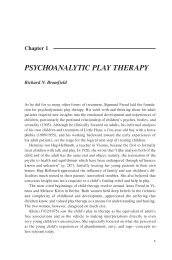IRAQ WAR CLINICIAN GUIDE
Iraq War Clinician's Guide - Network Of Care
Iraq War Clinician's Guide - Network Of Care
Create successful ePaper yourself
Turn your PDF publications into a flip-book with our unique Google optimized e-Paper software.
Iraq War Clinician Guide 68 Military Sexual Trauma<br />
One large-scale study found that compared to non-victims, rape survivors were 3.4 times more<br />
likely to use marijuana, 6 times more likely to use cocaine, and 10 times more likely to use other<br />
major drugs. In addition to these psychological conditions, victims of sexual trauma may continue<br />
to struggle with a range of other symptoms that interfere with their quality of life. Common<br />
emotional reactions include anger and shame, guilt or self-blame. Victims of sexual trauma may<br />
report problems in their interpersonal relationships, including difficulties with trust, difficulties<br />
engaging in social activities or sexual dysfunction. Male victims of sexual trauma may also express<br />
concern about their sexuality or their masculinity.<br />
How Has the VA Responded to the Problem of Military Sexual Trauma?<br />
Given the alarming prevalence rates of sexual harassment and sexual assault among military<br />
veterans, it has been necessary for the VA to respond actively to the healthcare needs of veterans<br />
impacted by these experiences. In July 1992, a series of hearings on women veterans' issues by the<br />
Senate Veterans Affairs Committee first brought the problem of military sexual trauma to policy<br />
makers' attention. Congress responded to these hearings by passing Public Law 102-585, which<br />
was signed into law in November of 1992. Among other things, Public Law 102-805 authorized<br />
health care and counseling to women veterans to overcome psychological trauma resulting from<br />
experiences of sexual assault or sexual harassment during their military service. Later laws<br />
expanded this benefit to male veterans as well as female veterans, repealed limitations on the<br />
required duration of service, and extended the provision of these benefits until the year 2005.<br />
Following the passage of these public laws, a series of VA directives mandated universal screening<br />
of all veterans for a history of military sexual trauma and mandated that each facility identify a<br />
Military Sexual Trauma Coordinator to oversee the screening and treatment referral process.<br />
Are There Screening, Assessment or Treatment Issues That Are Unique to Sexual Assault and<br />
Harassment?<br />
Screening. It is important to screen all veterans for a history of sexual harassment and assault. Not<br />
only is universal screening mandated by VA, it also represents good clinical practice given the<br />
high prevalence rates of military sexual trauma among male and female veterans and the<br />
reluctance of many sexual trauma survivors to volunteer information about their trauma histories.<br />
Screening for all forms of trauma exposure should be approached with compassion and sensitivity,<br />
but screening for a history of sexual trauma requires particular care because of the stigma<br />
associated with this type of victimization. For accurate screening, good rapport with the veteran is<br />
essential, as is close attention to issues of confidentiality (e.g., not screening in the presence of<br />
other providers or family members). Regardless of the care taken by the interviewer, the victims'<br />
shame and self-blame may prevent or delay disclosure, particularly for male victims or for victims<br />
who have experienced punishment or disbelief following previous disclosures.<br />
When screening for a history of sexual trauma it is important to avoid words like "rape" and<br />
"sexual harassment." Asking the question, "While you were in the military, were you ever raped?"<br />
assumes that the victimized person knows how rape is defined and perceives what happened to<br />
them as a rape. Additionally, these words are "loaded terms" for many people and a victim may<br />
respond negatively in order to avoid the social stigma that goes along with being a rape victim. A<br />
method of screening that is likely to yield fairly accurate results without being perceived by the<br />
veteran as too intrusive involves two general questions that use descriptive, non-judgmental<br />
wording (i.e., While you were in the military did you ever experience any unwanted sexual<br />
- - ..<br />
P<br />
DEPARTMENT OF VETERANS AFFAIRS<br />
NATIONAL CENTER FOR PTSD




